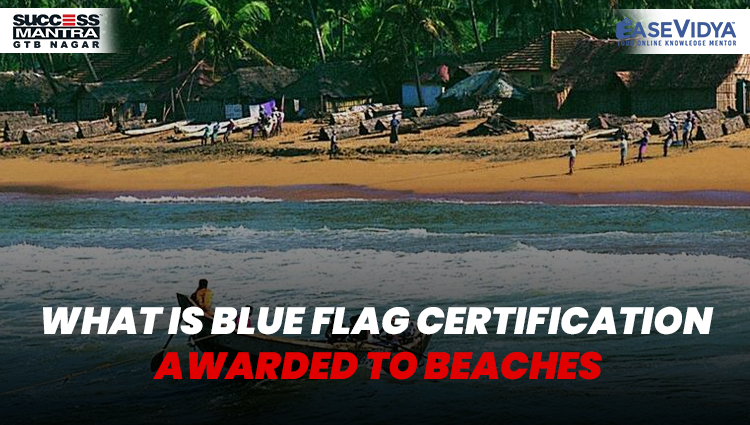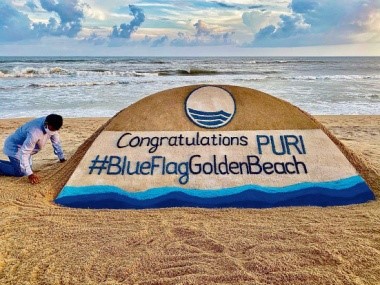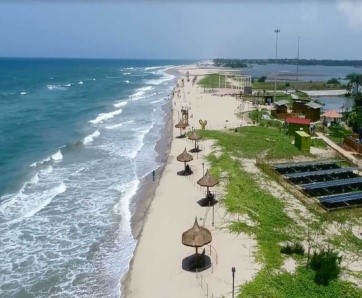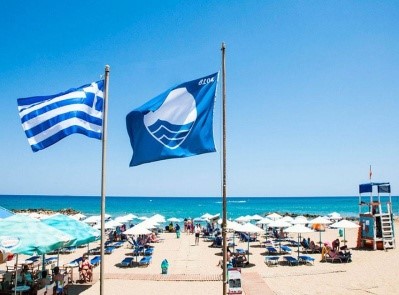
WHAT IS BLUE FLAG CERTIFICATION AWARDED TO BEACHES
WHAT IS BLUE FLAG CERTIFICATION AWARDED TO BEACHES

Two more beaches, namely Kovalam beach in Tamil Nadu and Eden beach in Puducherry in India have been awarded ‘Blue Flag’ certification. The total number of beaches in India with the Blue Flag certification has now reached ten, of which eight beaches got the certification in October. These eight beaches have been given re-certification as well. Blue Flag beaches are considered to be the cleanest beaches in the world. Minister for Environment, Forest, and Climate Change Bhupender Yadav to mark this as another milestone in India’s journey towards a Clean and Green India led by PM Narendra Modi.
Current Affairs Notes By Success Mantra Coaching Institute GTB Nagar Delhi CLICK HERE
BLUE FLAG BEACHES IN INDIA
In 2020, eight beaches in India were given the Blue Flag certification. It was an outstanding feat as no nation has ever been awarded Blue Flag for eight beaches in a single attempt. These eight beaches are:
(i) Kappad (Kerala)
(ii) Shivrajpur (Gujarat)
(iii) Ghoghla (Diu)
(iv) Kasarkod and Padubidri (Karnataka)
(v) Rushikonda (Andhra Pradesh)
(vi) Golden (Odisha)
(vii) Radhanagar (Andaman & Nicobar Islands)
WHAT IS BLUE FLAG CERTIFICATION?

The Blue Flag certification is an international eco-level tag that is given by the Foundation for Environment Education in Denmark (FEE). FEE Denmark regularly monitors and audits for strict compliance with the 33 criteria at all times. The Certification is given to a beach, marina, or sustainable boating tourism operator. It serves as an eco-label. It is awarded annually.
The international jury comprises members are from:
Foundation for Environment Education in Denmark (FEE),
United Nations World Tourism Organization (UNWTO),
United Nations Environment Programme (UNEP),
International Union for Conservation of Nature (IUCN),
United Nations Educational, Scientific and Cultural Organization (UNESCO)
Blue Flag beaches are considered the cleanest beaches of the world. It is an eco-tourism model endeavouring to provide the tourists/beachgoers clean and hygienic bathing water, facilities, a safe and healthy environment and sustainable development of the area. On the lines of Blue Flag certification, India has also launched its own eco-label BEAMS (Beach Environment & Aesthetics Management Services).
WHAT IS THE CRITERIA TO GET BLUE FLAG CERTIFICATION?
The criteria for Blue Flag Certification include standards for safety, quality, environmental education and information along with the provision of services and general environmental management criteria. The Blue Flag certification is accorded to beaches, marinas and sustainable boating tourism operators. The certification indicates their high environmental and quality standards.
Which nation has the highest number of Blue Flag Beaches?: Spain with 578 Blue Flag Beaches has the highest number of Blue Flag beaches in the world, followed by Turkey that has 436 Blue Flag Beaches. Greece stands third with 395 Blue Flag Beaches, closely followed by France that has 394 Blue Flag beaches and then Italy that has 342 Blue Flag Beaches.
BLUE FLAG PROGRAMME: BACKGROUND

The Blue Flag concept was first adopted as a pilot scheme in France in 1985 when French coastal municipalities were awarded the Blue Flag based on criteria of covering sewage treatment and bathing water quality. In 1987, the Foundation for Environmental Education in Europe (FEEE) presented the concept of the Blue Flag to the European Commission and then it was agreed to launch the Blue Flag Programme as one of the Commission's several "European Year of the Environment" activities in the Community that year. The French concept of the Blue Flag was further expanded to include other areas of environmental management such as waste management and coastal planning and protection. Beaches and marinas also became eligible for the Blue Flag under the programme. In 2001, FEEE rules were changed to permit non-European national organisations, which share the objectives of FEEE, to become members of the foundation. This led the foundation to drop Europe from its name, becoming the Foundation for Environmental Education (FEE). A waving ‘Blue Flag’ indicates 100 percent compliance with these 33 stringent criteria and showcases the sound health of the beach across four major areas under the Blue Flag programme.
DEVELOPMENT OF BEACHES TO ACHIEVE CERTIFICATION
- The Environment Ministry achieved the below-mentioned results during the process of environmental management and sustainable development of the 10 beaches with Blue Flag certification.
- Sustainable development of coastal regions by the Environment Ministry: The Ministry of Environment, Forest, and Climate Change had started the sustainable development of coastal regions on World Environment Day in June 2018 with the launch of a beach cleaning campaign called ‘I am saving my beach’ across 13 coastal states. The Ministry later implemented the program Beach Environment and Aesthetics Management Services (BEAMS).
BEAMS PROGRAMME
Beach Environment & Aesthetics Management Services comes under ICZM (Integrated Coastal Zone Management) project. This was launched by the Society of Integrated Coastal Management (SICOM) and the Union Ministry of Environment, Forest and Climate Change (MoEFCC).
The objectives of BEAMS program is to:
- Abate pollution in coastal waters,
- Promote sustainable development of beach facilities,
- Protect & conserve coastal ecosystems & natural resources,
- Strive and maintain high standards of cleanliness,
- Hygiene & safety for beachgoers in accordance with coastal environment & regulations.
It has helped in saving 1,100 ml/year of municipal water through recycling; educating around 1,25,000 beachgoers about responsible behaviour at the beaches; providing alternate livelihood opportunities to 500 fishermen families through pollution abatement, safety and services and has also increased footfall for recreation activities at the beaches by approximately 80% leading to economic development.
PRAVAHINI Current Affairs Notes By Success Mantra Coaching Institute GTB Nagar Delhi CLICK HERE
TEST YOURSELF
Q.1 Recently, which of the following two beaches are awarded with the Blue Flag Certification (an international eco-level tag)?
- Kovalam beach in Tamil Nadu
- Eden beach in Puducherry
- Rushikonda beach in Andhra Pradesh.
- I & III follows
- I & II follows: ANSWER
- I, II & III follows
- None of the above
Q.2 In India, which of the following is the Union Minister for Environment, Forest, and Climate Change after the Cabinet Reshuffle 2021?
- Bhupendra Yadav: ANSWER
- Kiren Rijiju
- Ramesh Pokhriyal
- None of the above
Q.3 Consider the given statements & state which of the following is/are incorrect in the reference to the above mentioned passage?
- The Blue Flag certification is an international eco-level tag that is given by the Foundation for Environment Education in Denmark (FEE).
- The total number of beaches in India with the Blue Flag certification has now reached eleven (11), of which nine (9) beaches got the certification in October.
- Only I follows
- Only II follows: ANSWER
- Both I & II follows
- None of the above
Q.4 In 2020, eight beaches in India were given the Blue Flag certification. It was an outstanding feat as no nation has ever been awarded Blue Flag for eight beaches in a single attempt. Which of the following is not one of them?
- Kappad (Kerala)
- Shivrajpur (Gujarat)
- Eden beach (Puducherry)
- Ghoghla (Diu)
Q.5 Which of the following statements is/are correct regarding the objectives & aims of the Beach Environment & Aesthetics Management Services (BEAMS) project?
- Abate pollution in coastal waters.
- Promote sustainable development of beach facilities.
- Protect & conserve coastal ecosystems & natural resources.
- All of the above-mentioned: ANSWER












0 Comment